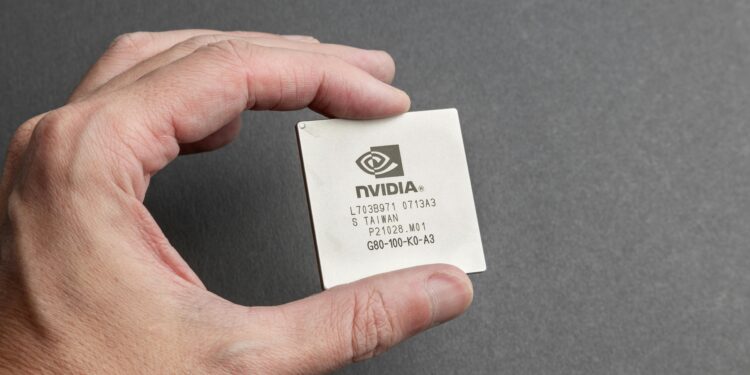Chinese AI Chipmakers Gain Ground as Nvidia Faces Regulatory Roadblocks
Nvidia (NVDA), the semiconductor giant known for its cutting-edge artificial intelligence (AI) chips, saw its stock fall as much as 2.8% in premarket trading on Monday. This decline followed reports that Chinese regulators are discouraging domestic companies from purchasing Nvidia’s AI chips in favor of local alternatives. Amid escalating trade tensions between the United States and China, Nvidia’s performance has come under pressure, with the stock closing down 2.2% on Friday to $121 and continuing to dip on Monday.
Despite the early losses, Nvidia shares pared their decline to about 1.4% after the market opened, trading around $120. The company has been caught in the crossfire of the ongoing US-China tech rivalry, and this latest move by Chinese regulators further complicates Nvidia’s path forward in a crucial market.
China Urges Local Chip Purchases
Reports emerged late last week that Beijing is encouraging Chinese companies to source AI chips from domestic manufacturers instead of relying on Nvidia’s dominant position in the GPU (graphics processing unit) market. The timing of this policy aligns with heightened US export controls aimed at limiting China’s access to advanced semiconductor technologies, particularly in the realm of AI.
Nvidia has been a key player in the global AI arms race, with its GPUs serving as the backbone for many AI applications, including machine learning and data processing. However, as the United States tightens export restrictions, China is increasingly looking inward to develop its own AI chip capabilities. This shift could have significant ramifications for Nvidia, which has historically relied on China as a major revenue stream for its data center products.
Chinese AI chipmaker Cambricon Technologies (688256.SS), a competitor of Nvidia, saw its stock surge 20% in Monday trading, underscoring the growing momentum of domestic players in the AI chip space. While Nvidia has dominated the AI hardware market for years, Cambricon and other Chinese companies are rapidly gaining traction as Beijing pushes for self-sufficiency in key tech sectors.
Nvidia’s Response to US Export Controls
The impact of US export restrictions on Nvidia’s business has been substantial. In late 2022, the US government enacted stricter controls on the export of advanced AI chips to China, aiming to curb the country’s ability to outpace the US in AI development. As a result, Nvidia’s sales to China, which represented 14% of its data center revenue in the fiscal year ending January 2024, have been directly affected. This figure is down from 19% the previous year, illustrating the headwinds Nvidia faces in the region.
In response to these challenges, Nvidia has worked to circumvent the roadblocks by designing specialized chips that meet US regulatory requirements while still being available in China. One of these is the “H20” Hopper chip, specifically tailored for the Chinese market and compliant with US export laws. Despite the hurdles, Nvidia’s H20 chip is expected to generate $12 billion in revenue this year alone, demonstrating the company’s ability to adapt in a difficult regulatory environment.
Nvidia also plans to launch a modified version of its latest Blackwell chip, dubbed the “B20,” for China. However, no official release date has been announced for this new product. In the meantime, the black market for Nvidia chips in China has been flourishing, highlighting the pent-up demand for high-performance AI hardware despite regulatory limitations.
Recovering Sales and Investor Optimism
Despite the setbacks, Nvidia’s sales in China have recovered in recent quarters. In its most recent earnings report for the quarter ending July 28, Nvidia reported $3.7 billion in revenue from China, marking a 33.8% increase year-over-year. This growth suggests that demand for Nvidia’s products remains robust, even as regulatory pressures mount.
Nvidia’s stock has performed exceptionally well in 2024, up 144% since the start of the year. Analysts remain bullish on the company’s long-term prospects, with approximately 90% of Wall Street analysts recommending a buy rating. According to consensus estimates from Bloomberg, Nvidia shares are expected to rise to $147.61 over the next year, indicating strong investor confidence despite the volatility.
Daniel Newman, CEO of the Futurum Group, commented on the current state of the semiconductor sector, noting that there is “strong optimism right now from the top leaders.” He also pointed out that Nvidia’s stock has experienced greater volatility since its 10-for-1 stock split in June, but he remains optimistic about the company’s future growth prospects.
Navigating the US-China Trade Conflict
The semiconductor sector, and Nvidia in particular, has been at the center of the US-China trade dispute. As both nations vie for supremacy in AI and other advanced technologies, companies like Nvidia are being forced to navigate an increasingly complex regulatory landscape. The Chinese government’s push to boost its domestic chipmaking industry is a direct response to US export controls, and it represents a growing threat to Nvidia’s market share in the region.
While Nvidia continues to innovate and launch new products, its ability to maintain a strong presence in China will likely hinge on its capacity to adapt to these shifting geopolitical dynamics. For now, investors appear cautiously optimistic about Nvidia’s future, even as the company faces short-term headwinds from regulatory challenges and heightened competition in China.
You might like this article:Nio’s $1.9 Billion Cash Injection Fuels Stock Surge Amid Losses











